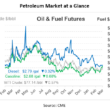Roar B2B, the UK trade show group (owned by Apiary private equity and led by former Reed, UBM and Clarion executive Duncan Kirk) has acquired the 20-year-old Environment Media Group Ltd (EMG). The deal brings together Roar’s RWM exhibition and EMG’s LetsRecycle.
The privately-owned EMG employs 15 people and had revenue of almost £3m in 2019. It is believed Roar is paying some £5m for the business.
The deal comes almost two years after Roar’s £24.7m equity buyout of Prysm Media Group’s events in three verticals: environment (Recycling and Waste Management), marketing (B2B Marketing Expo) and healthcare tech (Naidex) – just a few months before the pandemic. The price is believed to have been 2.5 x revenue in 2019.
Roar, which employs almost 80 people, is preparing for the September resumption at Birmingham’s NEC of its two largest events, Naidex (mobility, accessibility and senior care) and RWM (recycling, waste and sustainability). It is believed that exhibitor bookings are some 85% of 2019 but – in common with most other organisers – the cash performance will be depressed by the substantial impact of rolling over payments made during 2019. The two shows are expected to be largely domestic UK, with international visitors and exhibitors impacted both by the pandemic and also by Brexit interruptions to the country’s trade with the EU.
These are, of course, early days in the post-pandemic resumption of trade shows. But some companies believe the industry will rebound at a slower rate than has been forecast, with full recovery perhaps not until 2023.
Although Roar is as yet still a small player with a projected £10-15m revenue, this investment (and also Eagletree’s in the AgriBriefing UK business) demonstrates continuing private equity commitment to trade shows. While the industry is awash with talk of omni-channels and multi-platform operations, we might expect specialists (like Roar) to invest decisively in information services and content. More than ever, this could become the era of increased specialisation in trade show ownership.
Such information-events companies might, similarly, exploit their forced concentration on domestic business to build international cross-promotion and sales partnerships with their counterparts elsewhere. It may be several years before travel and transport become as freely available and affordable as they were pre-pandemic. Meantime, former competitors can become partners and catalysts for growth.
There are many other small-medium exhibition deals underway. But all eyes are on the larger players and how any delay in the industry’s recovery might affect investment – and divestment in 2022.




